Transcriptions/ Translations
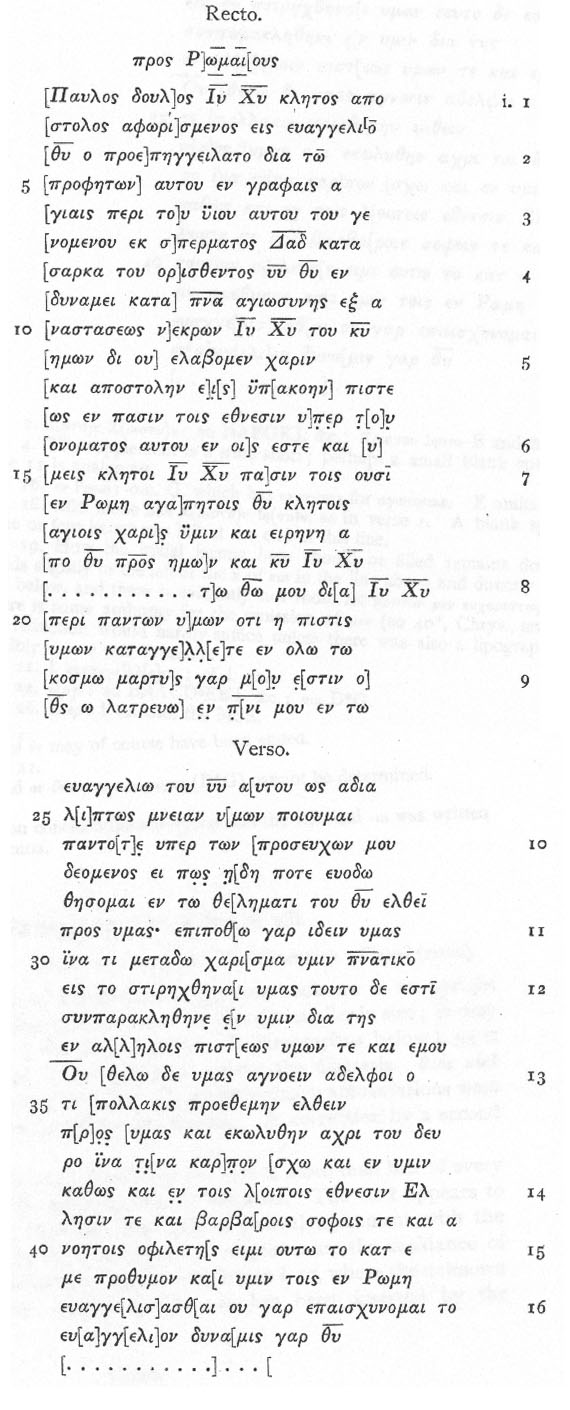
Papyrus Oxy. 1354 ("P-26"),
Romans 1:1-16. Verso
Language: Greek.
Origin: [Oxyrhynchus, Egypt: 6th century].
King James
Version:
[1] Paul, a servant of Jesus Christ,
called to be an apostle, separated unto the gospel of God,[2]
(Which he had promised afore by his prophets in the holy scriptures,)
[3] Concerning his Son Jesus Christ our Lord, which was made of the
seed of David according to the flesh; [4] And declared
to be the Son of God with power, according to the spirit of holiness, by the
resurrection from the dead: [5] By whom we have
received grace and apostleship, for obedience to the faith among all
nations, for his name: [6] Among whom are ye also the
called of Jesus Christ:
[7] To all that be in Rome, beloved of God, called to
be saints: Grace to you and peace from God our Father, and the Lord Jesus
Christ.[8] First, I thank my God through Jesus Christ
for you all, that your faith is spoken of throughout the whole world.
[9] For God is my witness, whom I serve with my spirit
in the gospel of his Son, that without ceasing I make mention of you always
in my prayers; [10] Making request, if by any means
now at length I might have a prosperous journey by the will of God to come
unto you. [11] For I long to see you, that I may
impart unto you some spiritual gift, to the end ye may be established;
[12] That is, that I may be comforted together with
you by the mutual faith both of you and me. [13] Now I
would not have you ignorant, brethren, that oftentimes I purposed to come
unto you, (but was let hitherto,) that I might have some fruit among you
also, even as among other Gentiles. [14] I am debtor
both to the Greeks, and to the Barbarians; both to the wise, and to the
unwise. [15] So, as much as in me is, I am ready to
preach the gospel to you that are at Rome also. [16]
For I am not ashamed of the gospel of Christ: for it is the power of God
unto salvation to every one that believeth; to the Jew first, and also to
the Greek.
Revised Standard Version
Side by Side: P. Oxy. 1354 and
Westcott-Hort
Enlargement
Return to top of page.

Papyrus Oxy. 1269, List of Property.
Verso
Language: Greek.
Origin: [Oxyrhynchus, Egypt: 2nd century].
List of property:
“To Ptolemaeus, priest and exegetes in office, from Theonas son of
Isidorus and Soeris of the city of Oxyrhynchus. Appended is a copy of
the list which I presented to Sarapion, your predecessor as exegetes, of
the articles left to my nephew and niece, being minors, Sarapas and
Sarapous, by their deceased father, who was my full brother, Isas.
To Sarapion, priest and exegetes in office, from Theonas son of Isidorus
and Soerous of the city of Oxyrhynchus. Being asked by you for a list of
the furniture and other articles left to my nephew and niece, being
minors, Sarapas and Sarapous, by their deceased father who was my full
brother Isas, I declare that they are as follows:
a coffer supplied with a false key, another out of use, a box of bronze,
a plate or dish pledged by Isas during his lifetime to Panares for
twenty drachmae of silver, another box likewise pledged for ten drachmae
to the same Panares, a flask of tin pledged to the same person for four
drachmae, a ... coloured ... pledged to me for a further sum of twelve
drachmae, a tunic pledged to Tnephersois for eight drachmae, and a half
share in three weavers’ looms which belonged to his father, a pig sold
by me, Theon, after the death of my brother Isas for forty drachmae, a
large chest of bronze, one cup of tin and one of silver, a pillow ...
P. Oxy 1269
Bernard P. Grenfell and Arthur S. Hunt, The Oxyrhynchus papyri.
London: Egypt Exploration Fund, 1898-ongoing.
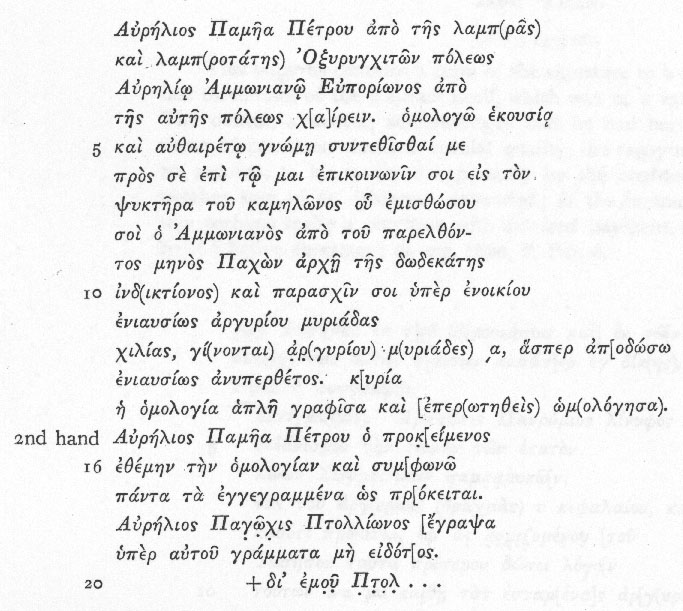
Papyrus Oxy. 1280,
[Partnership in a lease]. Recto
Language: Greek.
Origin: [Oxyrhynchus, Egypt: 4th century CE].
‘Aurelius Pamea son of Peter, of the illustrious and most illustrious
city of Oxyrhynchus, to Aurelius Ammonianus son of Euporion, of the said
city, greeting. I acknowledge that I have of my own free will covenanted
with you to share with you in the arbour of the camel- shed, which you,
Ammonianus, have leased, from the past month Pachon at the beginning of
the twelfth indiction, and to pay you yearly on account of rent one
thousand myriads of silver drachmae, total 1ooo rnyriads of silver,
which I will deliver yearly with no delay. This agreement, of which a
single copy is made, is valid, and in answer to the formal question
I have given my assent. (Signed) I, Aurelius Pamea son of Peter, the
aforesaid, have made the agreement and consent to all therein written,
as aforesaid. I, Aurelius Pagochis son of Ptollion, wrote for him, as he
is illiterate. Drawn up by me, Ptol . .
P. Oxy 1280
Bernard P. Grenfell and Arthur S. Hunt, The Oxyrhynchus papyri. London: Egypt Exploration Fund, 1898-ongoing.

Papyrus Oxy. 1369,
[Oedipus tyrannus].
Language: Greek.
Origin: [Oxyrhynchus, Egypt: 4th century CE].
688-710
OEDIPUS
Strange counsel, friend! I know thou mean'st me well,
And yet would'st mitigate and blunt my zeal.
CHORUS
(Ant. 2)
King, I say it once again,
Witless were I proved, insane,
If I lightly put away
Thee my country's prop and stay,
Pilot who, in danger sought,
To a quiet haven brought
Our distracted State; and now
Who can guide us right but thou?
JOCASTA
Let me too, I adjure thee, know, O king,
What cause has stirred this unrelenting wrath.
OEDIPUS
I will, for thou art more to me than these.
Lady, the cause is Creon and his plots.
JOCASTA
But what provoked the quarrel? make this clear.
OEDIPUS
He points me out as Laius' murderer.
JOCASTA
Of his own knowledge or upon report?
OEDIPUS
He is too cunning to commit himself,
And makes a mouthpiece of a knavish seer.
JOCASTA
Then thou mayest ease thy conscience on that score.
Listen and I'll convince thee that no man
Hath scot or lot in the prophetic art.
Here is the proof in brief.
731-751
JOCASTA
So ran the story that is current still.
OEDIPUS
Where did this happen? Dost thou know the place?
JOCASTA
Phocis the land is called; the spot is where
Branch roads from Delphi and from Daulis meet.
OEDIPUS
And how long is it since these things befell?
JOCASTA
'Twas but a brief while were thou wast proclaimed
Our country's ruler that the news was brought.
OEDIPUS
O Zeus, what hast thou willed to do with me!
JOCASTA
What is it, Oedipus, that moves thee so?
OEDIPUS
Ask me not yet; tell me the build and height
Of Laius? Was he still in manhood's prime?
JOCASTA
Tall was he, and his hair was lightly strewn
With silver; and not unlike thee in form.
OEDIPUS
O woe is me! Mehtinks unwittingly
I laid but now a dread curse on myself.
JOCASTA
What say'st thou? When I look upon thee, my king,
I tremble.
OEDIPUS
'Tis a dread presentiment
That in the end the seer will prove not blind.
One further question to resolve my doubt.
JOCASTA
I quail; but ask, and I will answer all.
OEDIPUS
Had he but few attendants or a train
Of armed retainers with him, like a prince?
775-784
My sire was Polybus of Corinth, and
My mother Merope, a Dorian;
And I was held the foremost citizen,
Till a strange thing befell me, strange indeed,
Yet scarce deserving all the heat it stirred.
A roisterer at some banquet, flown with wine,
Shouted "Thou art not true son of thy sire."
It irked me, but I stomached for the nonce
The insult; on the morrow I sought out
My mother and my sire and questioned them.
They were indignant at the random slur
Cast on my parentage and did their best
To comfort me, but still the venomed barb
Rankled, for still the scandal spread and grew.
819-827
Yea with these hands all gory I pollute
The bed of him I slew. Say, am I vile?
Am I not utterly unclean, a wretch
Doomed to be banished, and in banishment
Forgo the sight of all my dearest ones,
And never tread again my native earth;
Or else to wed my mother and slay my sire,
Polybus, who begat me and upreared?
1304-1310
Though to gaze on thee I yearn,
Much to question, much to learn,
Horror-struck away I turn.
OEDIPUS
Ah me! ah woe is me!
Ah whither am I borne!
How like a ghost forlorn
My voice flits from me on the air!
1351-1358
He meant me well, yet had he left me there,
He had saved my friends and me a world of care.
CHORUS
I too had wished it so.
OEDIPUS
Then had I never come to shed
My father's blood nor climbed my mother's bed;
Francis Storr, trans. "Oedipus the King."
Plays of Sophocles.[1912]. Project Gutenberg. 14 February, 2007 <
http://www.gutenberg.org/files/31/31-h/31-h.htm>.
P. Oxy 1369
Bernard P. Grenfell and Arthur S. Hunt, The Oxyrhynchus papyri.
London: Egypt Exploration Fund, 1898-ongoing.
Papyrus Oxy. 1389,
[Illiad], on vellum.
Language: Greek.
Origin: [Oxyrhynchus, Egypt: Late 4th century CE].
H 182-194 and H 218-230
P. Oxy 1389
Full Text of Illiad
Full Text
Perseus Project Greek
and English
Return to top of page.
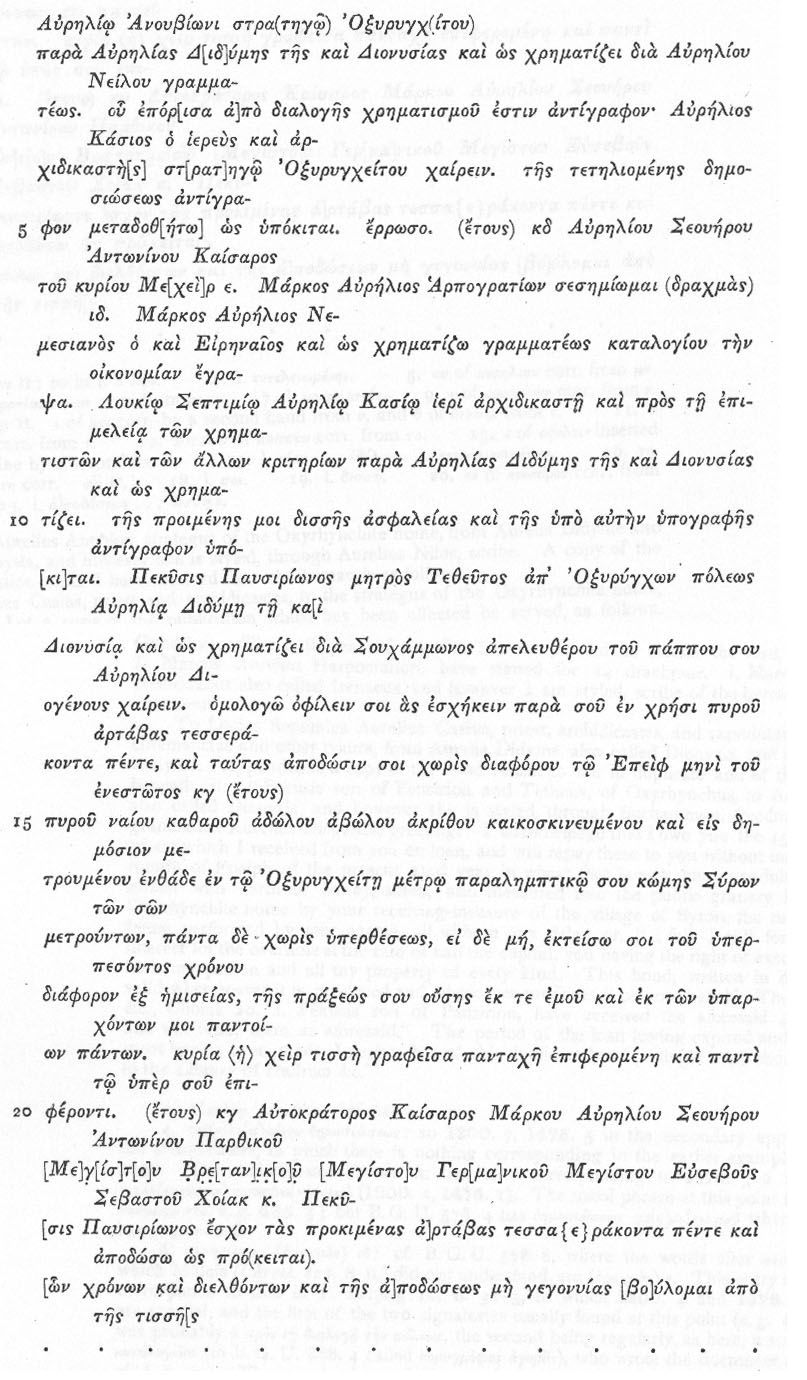
Papyrus Oxy. 1474,
[Application concerning a loan].
Language: Greek.
Origin: [Oxyrhynchus, Egypt: 216 CE].
Description: Manuscript on papyrus. Fragment of 1 leaf. 13.6 x 18.3 cm.
‘To Aurelius Anubion, strategus of the Oxyrhynchite nome, from Aurelia
Didyrne also called Dionysia, and however she is styled, through
Aurelius Nilus, scribe. A copy of the communication which I have
received from the bureau is as follows.
Aurelius Casius, priest and archidicastes, to the strategus of the
Oxyrhynchite nome, greeting. Let a copy of the publication which has
been effected be served, as follows.
Good-bye. The 24th year of Aurelius Severus Antoninus Caesar the lord,
Mecheir 5.
I, Marcus Aurelius Harpocration, have signed for 14 drachmae. I, Marcus
Aurelius
Nemesianus also called lrenaeus, and however I am styled, scribe of the
bureau, wrote thedocument.
To Lucius Septimius Aurelius Casius, priest, archidicastes, and
superintendent of the chrematistae and other courts, from Aurelia Didyme
also called Dionysia, and however she is styled Appended is a copy of
the bond issued to me in duplicate and of the signature beneath it.
“Pekusis son of Peusirion and Tetheus, of Oxyrhynchus, to Aur. Didyme
also called Dionysia, and however she is styled, through Suchammon,
freedman of your grandfather Aurelius Diogenes, greeting. I acknowledge
that I owe you the 45 artabae of wheat which I received from you on
loan, and will repay these to you without interest in the month of
Epeiph of the present 23rd year in wheat that is new, pure,
unadulterated, unmixed with earth or barley, sifted, and measured into
the public granary here in the Oxyrhynchite nome by your
receiving-measure of the village of Syron, the measurement being
performed by your agents, all without any delay, or, if I fail, I will
forfeit to you interest for the overtime at the rate of half the
capital, you having the right of execution upon both my person and all
my property of every kind. This bond, written in duplicate, is valid
wheresoever it is produced and whosoever produces it on your behalf. The
23rd year &c., Choiak 20. I, Pekusis son of Pausirion, have received the
aforesaid 45 artabae, and will repay them as aforesaid.” The period of
the loan having expired and no repayment having been made, I desire that
of this duplicate bond [a single copy should be sent to the Library of
Hadrian &c.
P. Oxy 1474
Bernard P. Grenfell and Arthur S. Hunt, The Oxyrhynchus papyri.
London: Egypt Exploration Fund, 1898-ongoing.

Papyrus Oxy. 1483,
[Letter of reprimand].
Language: Greek.
Origin: [Oxyrhynchus, Egypt: Late 2nd century CE].
‘Dius to Zoϊlus, greeting. You arranged with me to come before the 25th of the month of Tubi, and you have not come. When you went away, you rendered to me an account consisting of a list of what you had spent yourself. You write that you spent 33 jars upon the gardeners and two calves which you sacrificed, and you have spent upon them things of which absolutely no one has received the value, since you had it. Other claims are being made against you in the vineyard, of which you will have to render an account at the reckoning-office. Know that, unless you pay all quickly and discharge the claims made against you, I shall seize your surety, until you pay me the value of the claims. I pray for your health. (Addressed) To Zoϊlus from his friend Dius. Deliver to Zoϊlus from Dius.’
P. Oxy 1483
Bernard P. Grenfell and Arthur S. Hunt, The Oxyrhynchus papyri.
London: Egypt Exploration Fund, 1898-ongoing.

Papyrus Oxy. 1571,
[Order to a farmer].
Language: Greek.
Origin: [Oxyrhynchus, Egypt: 297 CE].
An order to a farmer to pay 23 artabae
of wheat to a centurion.
No translation available.
P. Oxy 1571
Bernard P. Grenfell and Arthur S. Hunt, The Oxyrhynchus papyri. London: Egypt Exploration Fund, 1898-ongoing.
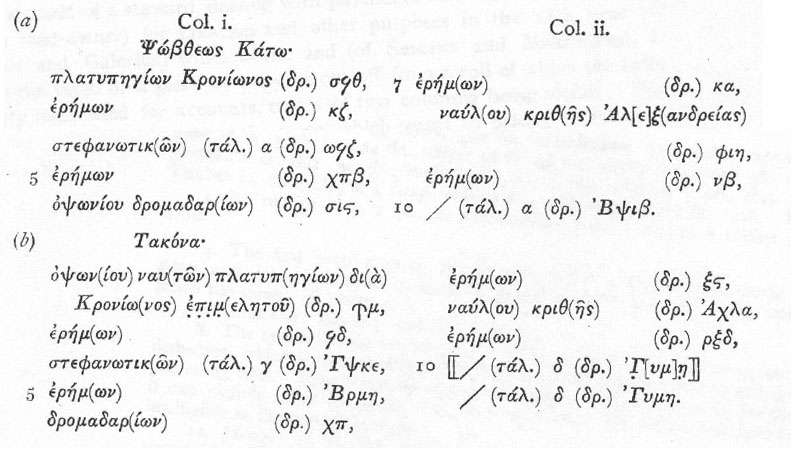
Papyrus Oxy. 1652,
[Accounts of transport].
Language: Greek.
Origin: [Oxyrhynchus, Egypt: Late 3rd century CE].
"These two short accounts, written by the same hand and following the same formula, relate to two villages in the lower toparchy of the nome. The names of the villages precede as headings, and below are entered various sums ... The items are concerned with transport either by land or water. "
P. Oxy 1652
Bernard P. Grenfell and Arthur S. Hunt, The Oxyrhynchus papyri.
London: Egypt Exploration Fund, 1898-ongoing.
Enlargement
Return to top of page.

Papyrus Oxy. 1714,
[Contracts for the deposit of money].
Verso
Language: Greek.
Origin: [Oxyrhynchus, Egypt: 3rd century CE].
This is the beginning of a contract in duplicate for a
deposit of money (approximately 110 talents). The joint reign in line 7
probably refers to Diocletian and Maximian.
P. Oxy 1714
Bernard P. Grenfell and Arthur S. Hunt, The Oxyrhynchus papyri.
London: Egypt Exploration Fund, 1898-ongoing.
Enlargement
Return to top of page.
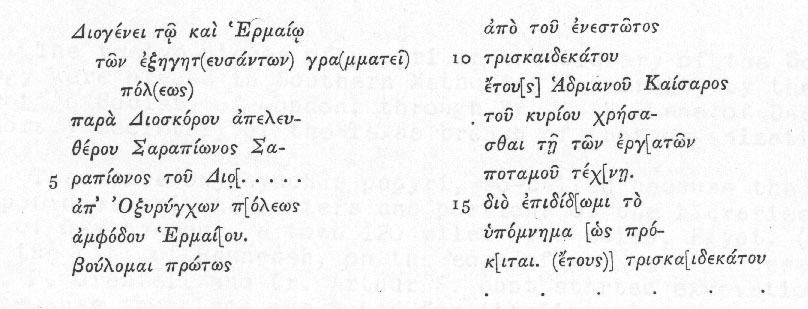
Papyrus Oxy. 1263,
[Announcement concerning
the practice of a trade].
Language: Greek.
Origin: [Oxyrhynchus, Egypt: 128-129 CE].
‘To Diogenes also called Hermaeus, ex-exegetes, scribe of the city, from
Dioscorus, freedman of Sarapion son of Sarapion son of Dio . . .,
inhabitant of Oxyrhyrchus in the quarter of Hermaeus. I wish to begin
from the present thirteenth year of Hadrianus Caesar the lord to
practise the trade of a river-worker; accordingly I present this
application as above.’
P. Oxy 1263
Enlargement
Return to top of page.
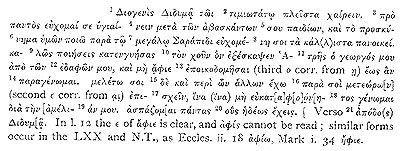
Papyrus Oxy. 1758,
[Private correspondence].
Language: Greek.
Origin: [Oxyrhynchus, Egypt: 128-129 CE].
"This is a letter from a woman, asking that an embargo should be placed on a mound that a tenant was digging on her land, and that no more work should be allowed until her arrival. The reverse side lists the address."
No translation available
P. Oxy 1758
Enlargement
Return to top of page.
[Receipt?].
Language: Greek.
Origin: [Greece?: c.100 CE].
No translation
available
Return to top of page.
